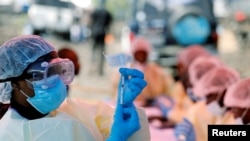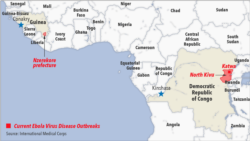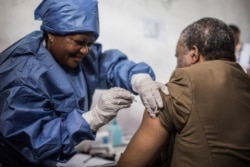West African countries are taking steps to prevent a regional outbreak of Ebola after the deadly virus killed at least five people in Guinea.
As Guinea launched an Ebola vaccination drive Tuesday, after an outbreak in the West African nation’s southern Nzérékoré region, its neighbors were also preparing.
The last Ebola outbreak in 2013 also started in Guinea and killed 11,300 people over three years as it spread to Liberia and Sierra Leone.
There were also cases in Mali, Nigeria, and Senegal and as far away as Europe and the United States.
The Ebola outbreak this month was traced to a funeral for a nurse who is suspected to have died of the virus. Out of four confirmed and four probable cases, a total of five people have died.
Nzérékoré, the capital of the region, is the second-biggest city in Guinea, and a regional transport hub.
Neighboring Sierra Leone declared a level two emergency response.
Doctors Without Borders’ Lindis Hurum in Kenema district, one of the regions hardest hit by the last outbreak, says they are now better prepared.
“Both the government — the Ministry of Health — and the population themselves will be more prepared this time for Ebola just because of the fact that they lived through that really large and painful outbreak in 2014-16. This we see already that people know what it is now,” said Hurum.
In neighboring Mali, which was largely spared from the last Ebola outbreak, authorities were focused on the country’s borders.
Dr. Akory Ag Iknane, the director of Mali’s National Institute for Public Health, says a team of health workers went to the border the day after Guinea declared the Feb. 14 outbreak.
"The next day we went to the border at Kourémalé, between Mali and Guinea, to see some of the measures being taken," he said. "We noted that the measures are in place to reinforce the border with equipment and Personal Protective Equipment [PPE], and to reactivate the vigilance team there, who were already set in motion in 2014 during the last epidemic."
During the last outbreak, non-Ebola related healthcare was severely impacted because of the strain the deadly virus put on the region’s healthcare systems.
While Guinea works to prevent the outbreak from spreading, Doctors Without Borders’ (MSF) Hurum says in Sierra Leone they will remain community focused.
“We know that the lessons learned from last time are very clear, and it’s to involve the community in all aspects, from day one, because they are the ones affected and they are the ones we need to listen to and engage with in order to stop the transmission,” said Hurum.
Ebola vaccines were developed after the 2013 West African outbreak and have already been used in the Democratic Republic of the Congo’s 2018 outbreak.
The World Health Organization delivered 11,000 doses of Ebola vaccine to Guinea on Monday evening and has teams helping with the vaccination campaign.






